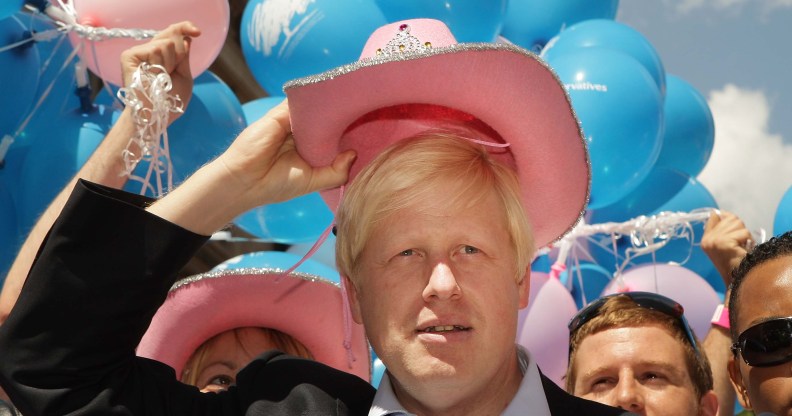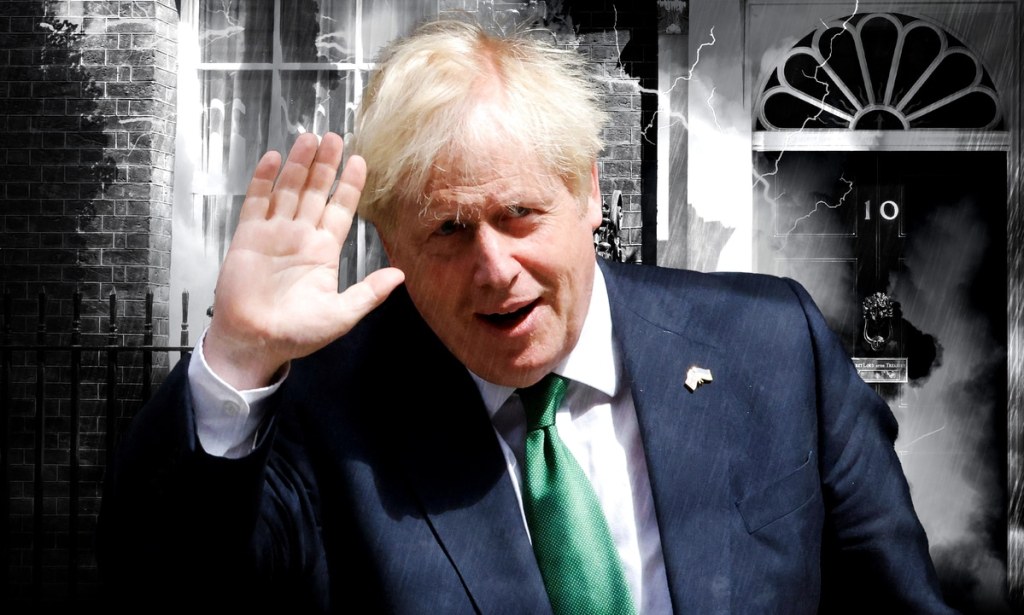Boris Johnson LGBT rights record: Anti-gay slurs mixed with surprisingly liberal stance

Then mayor of London Boris Johnson wears a pink stetson hat at the city’s Pride parade on July 5, 2008. (Peter Macdiarmid/Getty)
Boris Johnson is set to become Prime Minister, but the outspoken Conservative politician has a confusing record on LGBT+ issues.
Campaigners say it’s more important than ever that the next Prime Minister is a strong supporter of LGBT+ rights, with several major reforms up in the air and a growing backlash against LGBT-inclusive education.
But those wondering what might happen to long-promised gender recognition reforms and plans to outlaw conversion therapy will not get many answers from Boris Johnson’s LGBT+ rights record.
The leadership candidate, who has served as Mayor of London, Foreign Secretary and a figurehead for the pro-Brexit Vote Leave campaign, has an inconsistent record on LGBT+ issues that has repeatedly confounded expectations.
Boris Johnson has an early history of anti-LGBT gaffes
Ahead of the leadership vote, opponents of Johnson have focused fire on his history of casual anti-gay rhetoric in 1990s newspaper columns.
In his columns, Johnson referred to gay people as “tank-topped bum boys” and attacked “Labour’s appalling agenda, encouraging the teaching of homosexuality in schools.”
He also hit out at same-sex unions in his book Friends, Voters, Countrymen, published in 2001.

Johnson claimed: “If gay marriage was OK – and I was uncertain on the issue – then I saw no reason in principle why a union should not be consecrated between three men, as well as two men, or indeed three men and a dog.”
In Parliament, Boris Johnson was an early pro-LGBT rebel
Despite his early beliefs, Johnson’s legislative record is markedly more liberal.
Elected to Parliament for the first time in 2001, Johnson rebelled against his own party on several occasions to back LGBT+ rights measures.
Defying the Conservative leadership at the time, Johnson voted in 2003 to abolish Section 28, which banned the “promotion” of homosexuality in schools, and voted in 2004 to permit civil partnerships for same-sex couples.
Alongside George Osborne and John Bercow, Johnson was one of just a handful of Tory MPs who were willing to back the Labour government’s LGBT+ reforms.
The MP explained: “I object to schools being told what to do by government. That is why I voted against my party line and for the repeal of Section 28, in defiance of the Conservative Party line.”
As Mayor of London, Boris Johnson backed equal marriage
Serving as Mayor of London from 2008 to 2016, Johnson led the city’s Pride parade on several occasions.
While attending the event in 2010, Johnson became the highest-ranking Conservative to come out in support of marriage equality in an interview with PinkNews.
He told PinkNews: “If the Conservatives and Liberals can get together in a national coalition and settle their differences, I don’t see why you can’t have gay marriage.”
Two years later, he backed the Out4Marriage campaign calling on the government to pass equal marriage, adding: “I see absolutely no reason why that happy state should be denied to anybody in our country and that’s why I am supporting the Out4Marriage campaign.”
However, Johnson’s propensity for gaffes caught up with him in 2013, when he was forced to apologise for a joke about gay people.
Addressing a room full of LGBT+ activists, Johnson had quipped about gay men taking their husbands “up the Arcelor,” a reference to the observation tower in London’s Olympic Park.
Johnson skipped the Pride parade for several years towards the end of his time in office, missing the event in 2011, 2012, 2013, 2014 and 2015.
Reforms and controversy as Foreign Secretary
After becoming Theresa May’s Foreign Secretary in 2016, Johnson scrapped a controversial ban on Pride flags being flown from UK embassies and consulates around the world.
Reversing a long-standing policy, Johnson confirmed to PinkNews that he would permit embassies to fly rainbow flags to mark the International Day Against Homophobia, Biphobia and Transphobia and Pride celebrations.
The Foreign Secretary also met with Russian LGBT activists and praised their work on a trip to the country in 2017.
However, his time serving as Foreign Secretary also generated criticism from LGBT+ activists.
In 2018, Johnson greenlit a law in the British Overseas Territory of Bermuda that imposed a fresh ban on same-sex marriage, despite calls for him to invoke powers to block it on human rights grounds.
A court later ruled that the Bermudian anti-gay marriage law was indeed a violation of human rights.
Johnson also jumped to the defence of Spectator columnist and government advisor Toby Young in 2018, attacking a “ridiculous outcry” over his use of the terms “hard-core dykes” and “queer as a coot.”
Candidate promises to ‘champion’ LGBT+ issues if made Prime Minister
Johnson has not responded to interview requests from PinkNews ahead of the leadership vote.
However, in a statement to the LGBT+ Conservatives group, he said: “If I am lucky enough to be elected Conservative leader, I pledge that my administration will not consider this issue as ‘job done’.
“I will continue to champion LGBT+ equality, get tough on hate crime and ensure that we break down barriers to a fairer society.”
Outlining his priorities, Johnson said: “We must do more to ensure that trans rights are protected and those who identify as trans or intersex are able to live their lives with dignity.
“In our schools we must ensure that every young person feels safe and we should not allow the authority of teachers to be undermined by parents who unreasonably take their children out of school.
“Our fantastic NHS must provide for all, including all of the LGBT+ community, and we must call on business to ensure that no one is discriminated against for their sexuality or gender.”
He added: “We have already made so much progress as a Conservative government in championing equality and LGBT+ rights, but we must continue to still reform our society step by step, bringing people together while celebrating how we are all different.”

